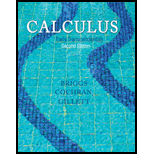
Concept explainers
Reduction formulas Use
47.
Want to see the full answer?
Check out a sample textbook solution
Chapter 7 Solutions
Calculus: Early Transcendentals (2nd Edition)
Additional Math Textbook Solutions
College Algebra with Modeling & Visualization (5th Edition)
A Problem Solving Approach To Mathematics For Elementary School Teachers (13th Edition)
Intro Stats, Books a la Carte Edition (5th Edition)
Elementary Statistics: Picturing the World (7th Edition)
University Calculus: Early Transcendentals (4th Edition)
Precalculus
- Find all values of x for the given function where the tangent line is horizontal. 3 =√x³-12x² + 45x+5arrow_forwardFind the equation of the tangent line to the graph of the given function at the given value of x. 6 f(x) = x(x² - 4x+5)*; x=2arrow_forwardFind the equation of the tangent line to the graph of the given function at the given value of x. f(x)=√√x+33; x=4arrow_forward


 Trigonometry (MindTap Course List)TrigonometryISBN:9781337278461Author:Ron LarsonPublisher:Cengage Learning
Trigonometry (MindTap Course List)TrigonometryISBN:9781337278461Author:Ron LarsonPublisher:Cengage Learning College AlgebraAlgebraISBN:9781305115545Author:James Stewart, Lothar Redlin, Saleem WatsonPublisher:Cengage Learning
College AlgebraAlgebraISBN:9781305115545Author:James Stewart, Lothar Redlin, Saleem WatsonPublisher:Cengage Learning Linear Algebra: A Modern IntroductionAlgebraISBN:9781285463247Author:David PoolePublisher:Cengage Learning
Linear Algebra: A Modern IntroductionAlgebraISBN:9781285463247Author:David PoolePublisher:Cengage Learning Functions and Change: A Modeling Approach to Coll...AlgebraISBN:9781337111348Author:Bruce Crauder, Benny Evans, Alan NoellPublisher:Cengage Learning
Functions and Change: A Modeling Approach to Coll...AlgebraISBN:9781337111348Author:Bruce Crauder, Benny Evans, Alan NoellPublisher:Cengage Learning





